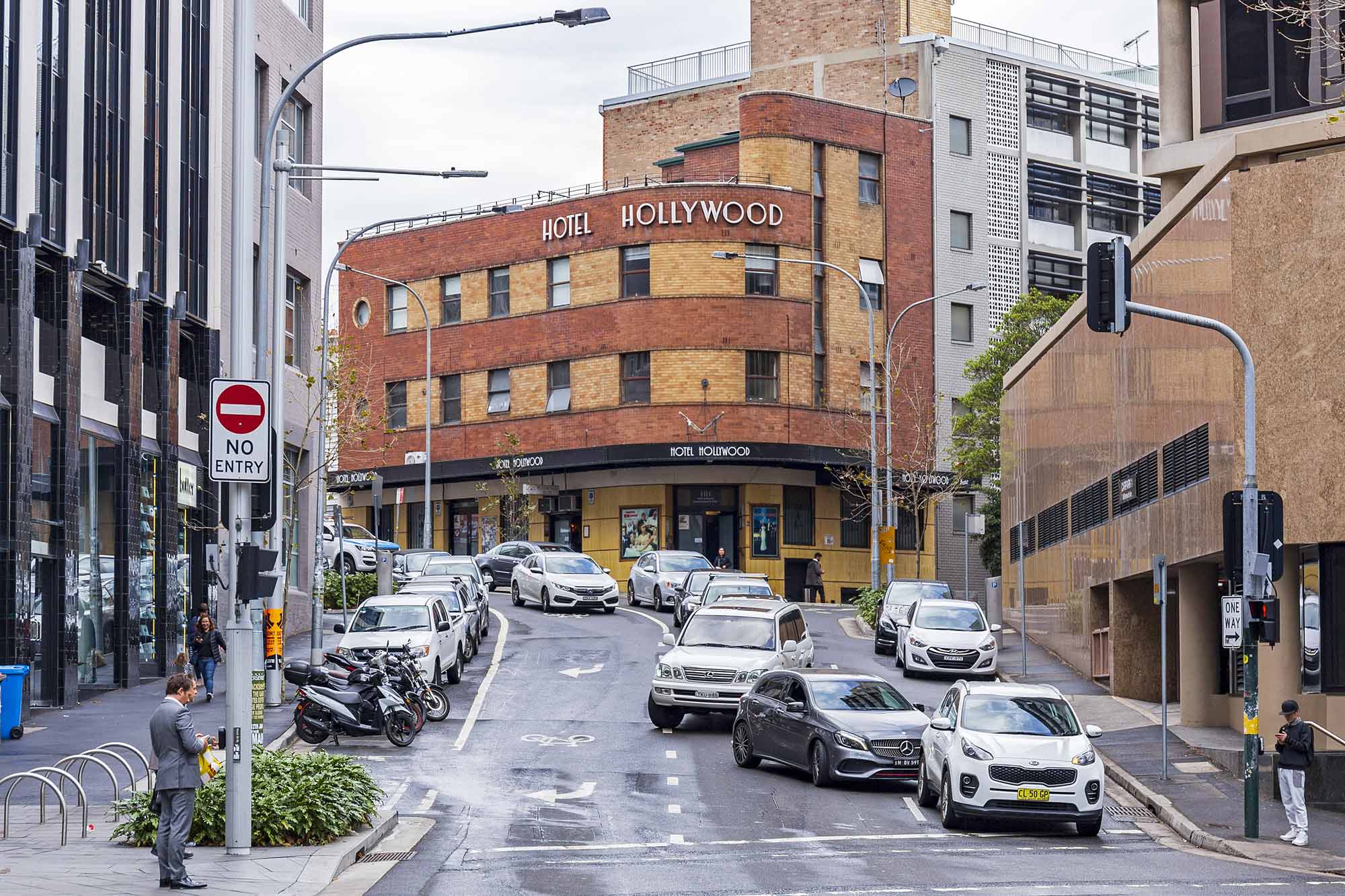‘The Hotel Hollywood is something we can’t afford to lose,’ writes Harriet Leigh
The Hotel Hollywood is up for sale. "There aren’t any left like this. And when this goes we’ll start to forget. We’ll start to forget all the magic that used to happen."

The Hotel Hollywood in Sydney’s Surry Hills is a rare beast: it is both an architectural gem, with its Art Deco facade wrapping around the corner of Foster street; and it’s a cultural icon, which was owned by Doris Goddard — a bonafide icon in her own right — until she passed away in 2019.
Yesterday, the Sydney Morning Herald reported that the Hotel Hollywood is up for sale, a sale which marks the end of an era and could potentially see the Hollywood transformed into an altogether different bar.
Below, we hear from Harriet Leigh, the head of hospitality for Sydney’s Archie Rose and someone who worked for Goddard at the Hollywood from 2001 to 2005, for her thoughts on the sale. She talks about what the Hollywood means to her, to the city, and what it was like working at one of the city’s most treasured bars.

When did you work there, and how would you describe the place? What was the Hollywood all about?
The Hollywood Hotel was the first small bar in Sydney. Long before the small bar licence existed. Back then all pubs were leviathans, before Justin Hemmes, before other smaller pub groups started building faux-distressed wooden menu boards and serving the same menu of Spicy Deep South Chicken Burgers. Back then Sydney pubs showed footy and had no soul. Most were just big, screens had appeared, pokies took over half the pub, and music was quiet and of the Aussie rock or US pop/rock variety.
But then there was The Hollywood. It had a coveted 3am licence and would play great music, loud. They had bands and DJs on weekends, cabaret shows in the back and frequent dancing on tables. Owned by the now-deceased Doris Goddard and managed by Mark Symons, this dynamic duo cultivated one of the greatest cultural icons in pub form. Doris made it to 89 and right up to the end was perched on her stool at the bar, drinking glasses of red wine.
She was the truest icon of publicans. She was one of the first publicans to let women in the front bar. According to Doris back in the 60s she had a couple that couldn’t afford the extra penny for the wife to drink in the back so they asked if she could come into the front. Doris asked the old blokes sitting at the bar if they minded — I can tell you right now that trying to disagree with Doris was not something many wise people would consider doing. “Not at all, Doris”, came the reply. She turned to the woman and said, “Now look here Mavis, there’ll be cussin’ and spittin’ and I don’t want to hear a word of complaint out of you.”
She was also for a time the president of the NSW AHA in the 80s — so she was not shy of rough politics — she was still campaigning against the lockout laws in her 80s, wheeled up to protests by Mark, both of them wearing their Keep Sydney Open T Shirts.
Doris died two years ago. Her funeral was epic, of course. The church was heaving. Not many of her peers were left, but the crowd was thick with people in their 20s, 30s, all the way up to their 80s. I was one of a very blessed all-female pallbearing team. She was a feminist and firebrand, and it felt so right that a team of her former bar wenches laid her to rest. Her guitar sat at the foot of her coffin, varnish worn away from decades of serenading the world. Even though she lived an incredibly rich and long life, it still felt cut short.
Before Doris was a publican in the 60s, she had been a bonafide movie star. She acted with Bob Hope and Katherine Hepburn among others. The lists of stars she acted with grew longer as her glass emptied. According to some of her stories she knew Marilyn and Kennedy, depending on the gullibility of her audience, and her state of imagination at the time. When she moved back to Australia she owned the Marly in Newtown, another pub in Surry Hills which is now a renovated block of units, and then the Hollywood.
I was lucky enough to work for Doris and Mark from 2001 to 2005. In that time I learnt how to break up a fight, and when to not break up a fight, how to serve and listen to your regular old boys at 3pm and wild revellers at 3am. I learnt how to work fast. And I learnt the value of a community pub. We were family to widowers and fairy godmothers to bright young things. But most importantly of all, I learnt that Blister In The Sun is the truly greatest song to put on to a heaving, drunken room at 2am.
In its heyday, from the late 90s to the mid-2000s it was so popular people would try to break in by climbing the awning and getting in upstairs because once it was at capacity, no one was leaving (after all there was nowhere else to go). When we closed people would leave en masse to go to the Judgement bar, which was rammed from 3 am until some time the next day — the sun would rise over Taylor Square and everyone would neck $3 Reschs while the day started. Others made their way to the Cross to drink at Barons or Deans. Some went to watch the sunrise on the beaches in the East. That was it for Sydney if you didn’t want to go to pay a cover charge to dance in a nightclub packed with a crowd on pingers.
Do you have a favourite story about Doris and the Hollywood?
I literally cannot think of one story to explain who Doris was. The greatest memories I have of Doris are her dresses, her wigs, and her guitar. I remember a woman came in a fancy looking outfit and Doris was feeling overlooked, so she went upstairs and changed into a golden sari with 10 feet of silk trailing behind her. She casually took her seat on the stage and sang a rousing song in Spanish with some flamenco thrown in for good measure. Taking her seat afterwards she had certainly regained her status as the first woman of the room. When Doris sang no one talked, everyone knew they were experiencing something rare, something that just doesn’t happen any more. One day she was regaling some unknowing girl about her life in Hollywood, smiling beatifically at her good grace in giving an audience. Which was soon wiped from her face when the girl exclaimed, “I just can’t believe I’ve met Doris Day!”
Doris left the room, upstaged by a ghost.
Doris told me that at the Marly the Hells Angels used to drink there, they’d roar in dozens on motorbikes, intimidating everyone but Doris. She told the head of the chapter, “Listen here, you’re the head of your gang and I’m the head of mine. If we have any problems here you come to me — no one else”.
“Sounds good, Doris” he said. According to her, they never had an issue after that.
I remember one night when we were sitting around having staffies, someone broke in through the keg hatch. I grabbed a broken pool cue behind the bar that we’d kept for that eventuality, Mark grabbed the phone and called the police — handily located across the road. Doris grabbed her glass and the bottle of wine and said, “Darlings, how exciting!”
How do you feel about the sale of the place, knowing how Sydney so often demolishes its history in favour of a new thing?
Mark told me the pub was going up for sale a couple of months ago. I’ve been looking for a sugar daddy ever since. If you know one — send them my way. The Hollywood is something we can’t afford to lose. It’s an original, just like Doris and Mark. The value of $10 million doesn’t for one moment cover the value of what this pub does for Sydney. There aren’t any left like this. And when this goes we’ll start to forget. We’ll start to forget all the magic that used to happen. Someone will buy it and turn it into a pokie palace, its heritage status might protect the tiles in the downstairs men’s loos from being replaced, but it won’t protect its soul being replaced. I feel bereft, because Sydney’s track record of looking after its pub culture isn’t great. My heart is heavy knowing that the odds aren’t good. When the new person does buy it I strongly suggest we all write to them, tell them what they have if they don’t know, and keep our eyes out for development notices.
What are the things about the Hollywood you’d like to see the new owners keep?
Well, they have to keep the heritage, so the tiles and deco fittings are safe, but I really hope they keep the music, the cabaret, and the dancing on tables.
What else should we know?
The only real upside is that from the sale is Mark is going to retire. And I know there are thousands of people who will be feeling that no one deserves to more. He’s worked every day, in that pub, till all hours, for 20+ (maybe 25?) years. It’s right for him to go and relax. It’s just not fine for the old girl herself, The Hollywood, to follow.

